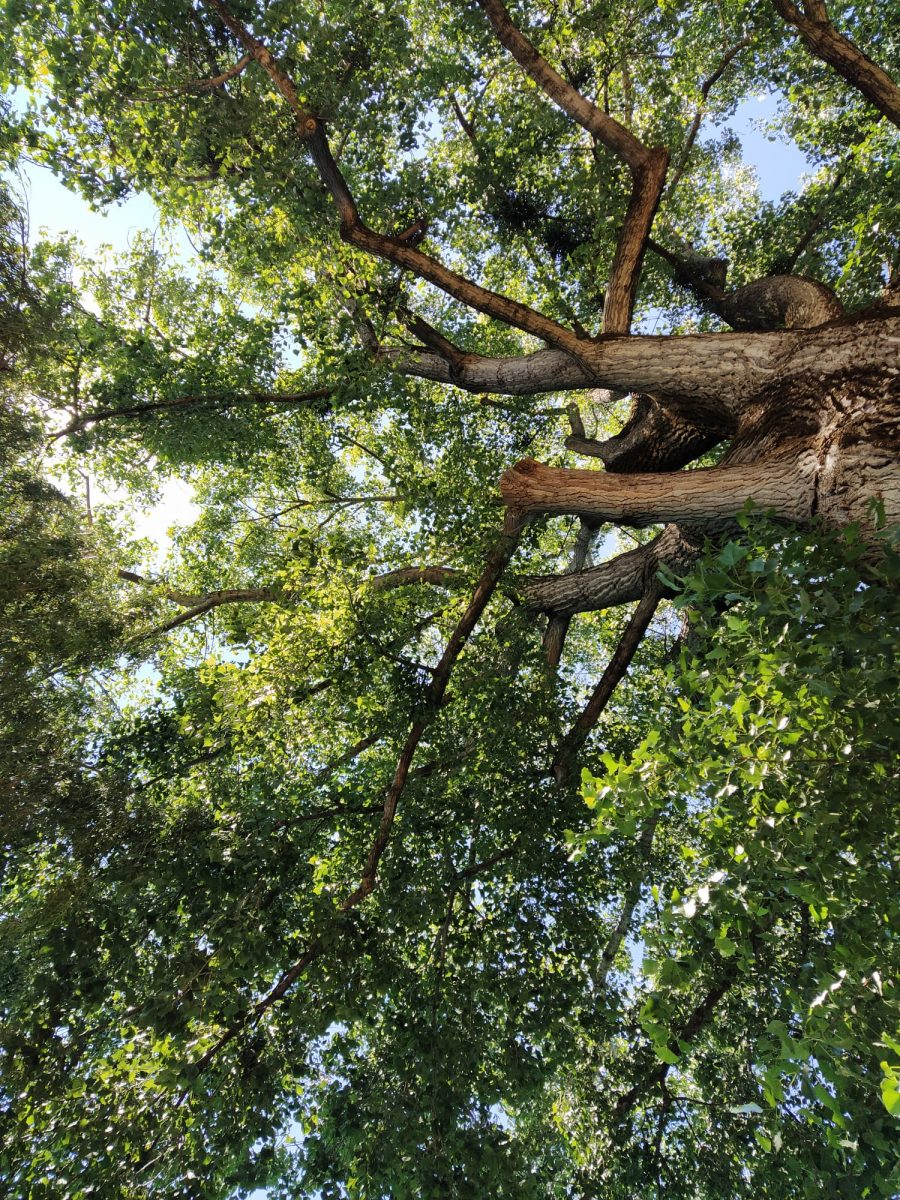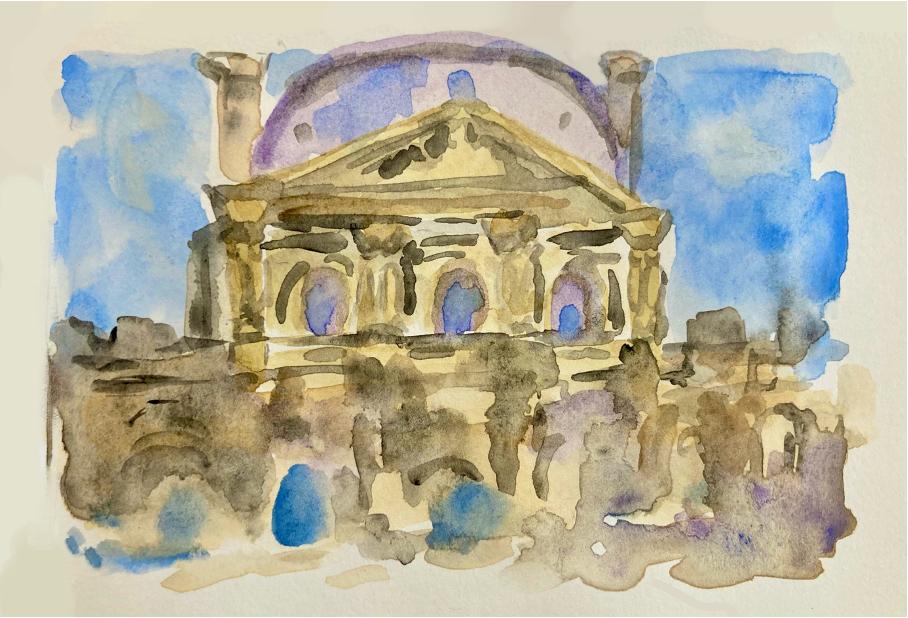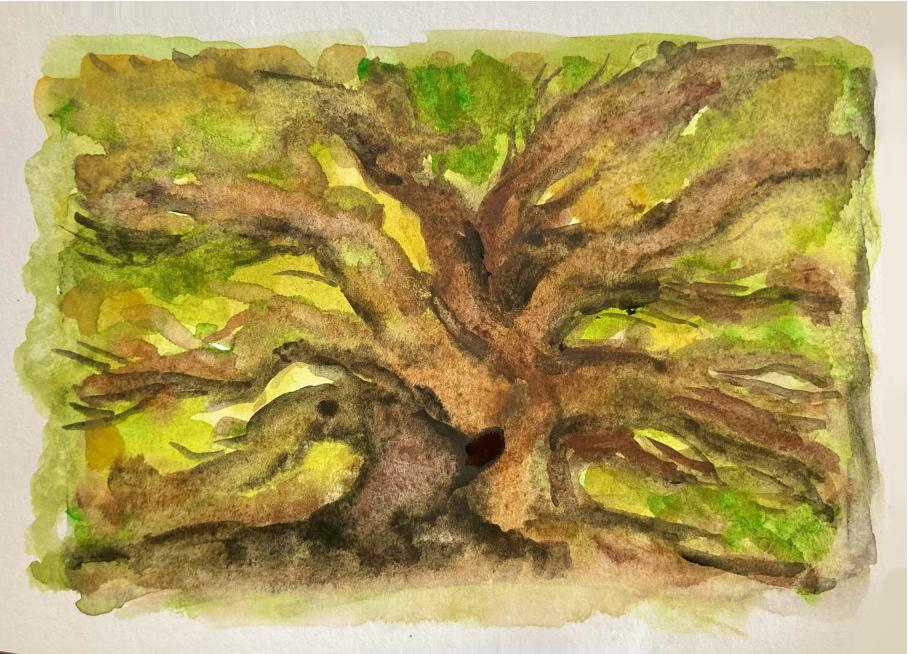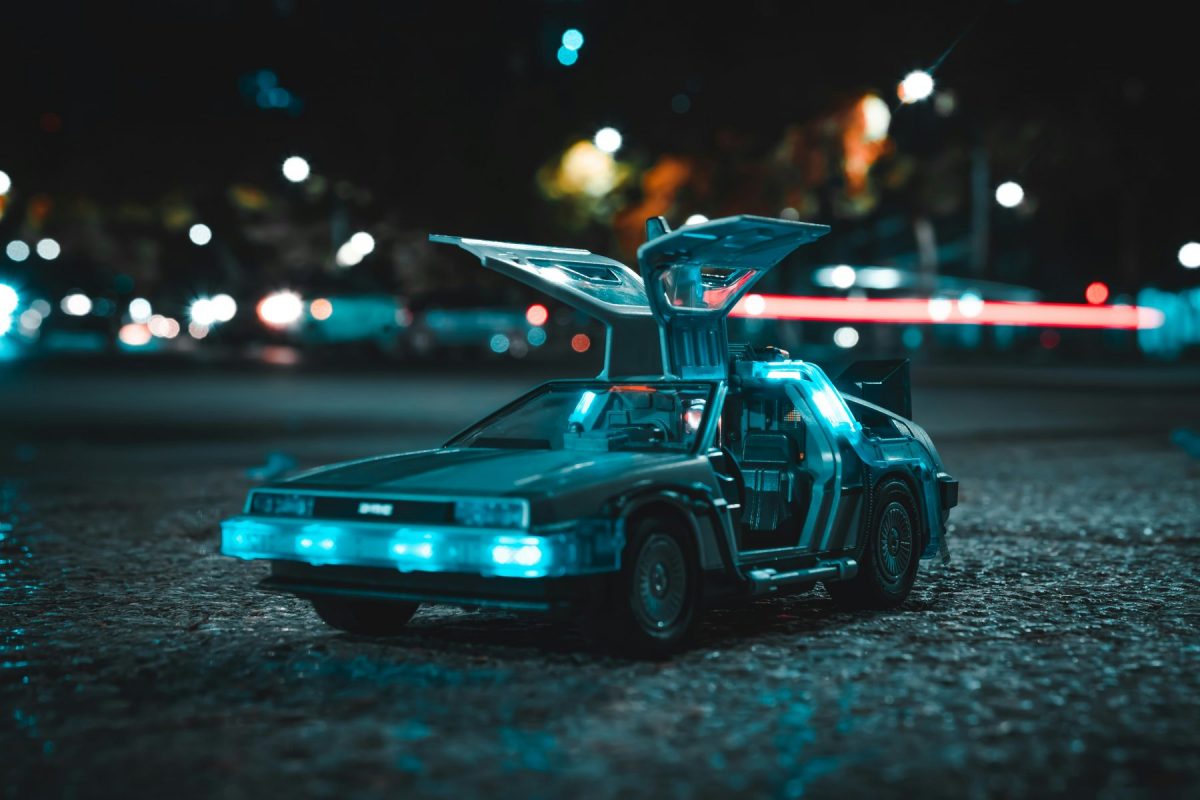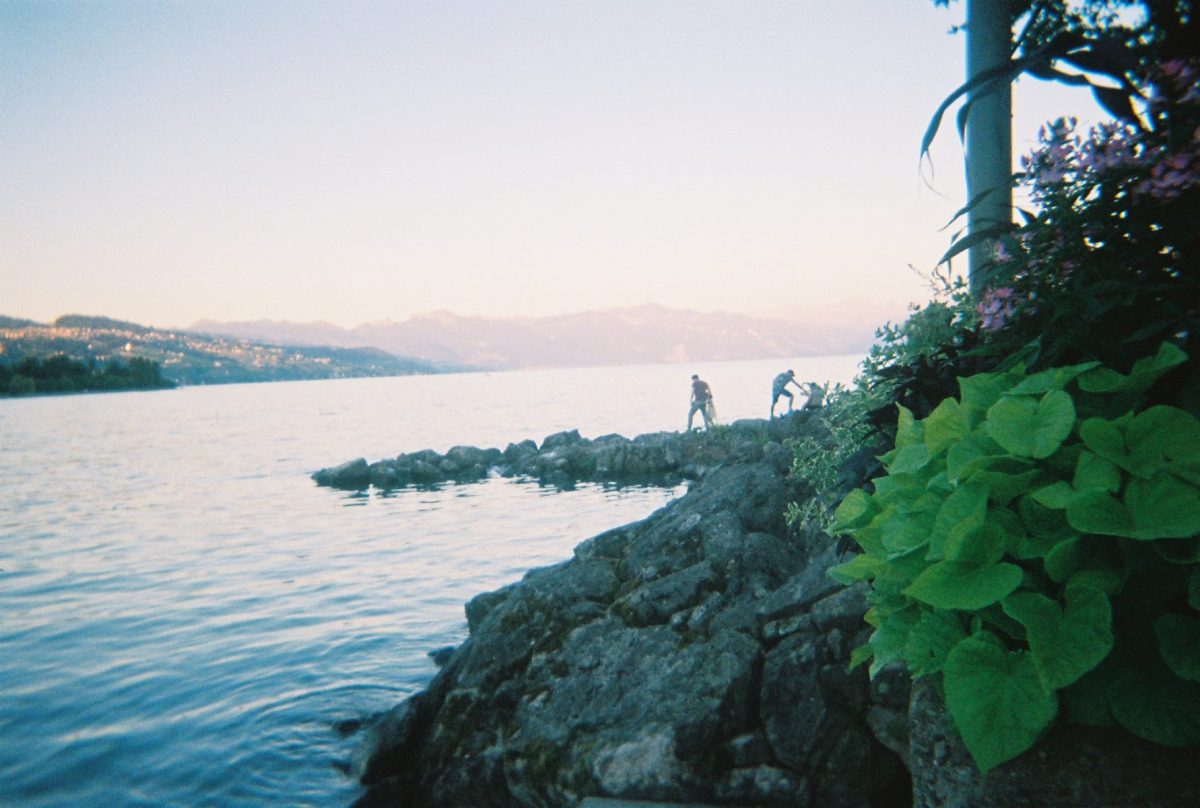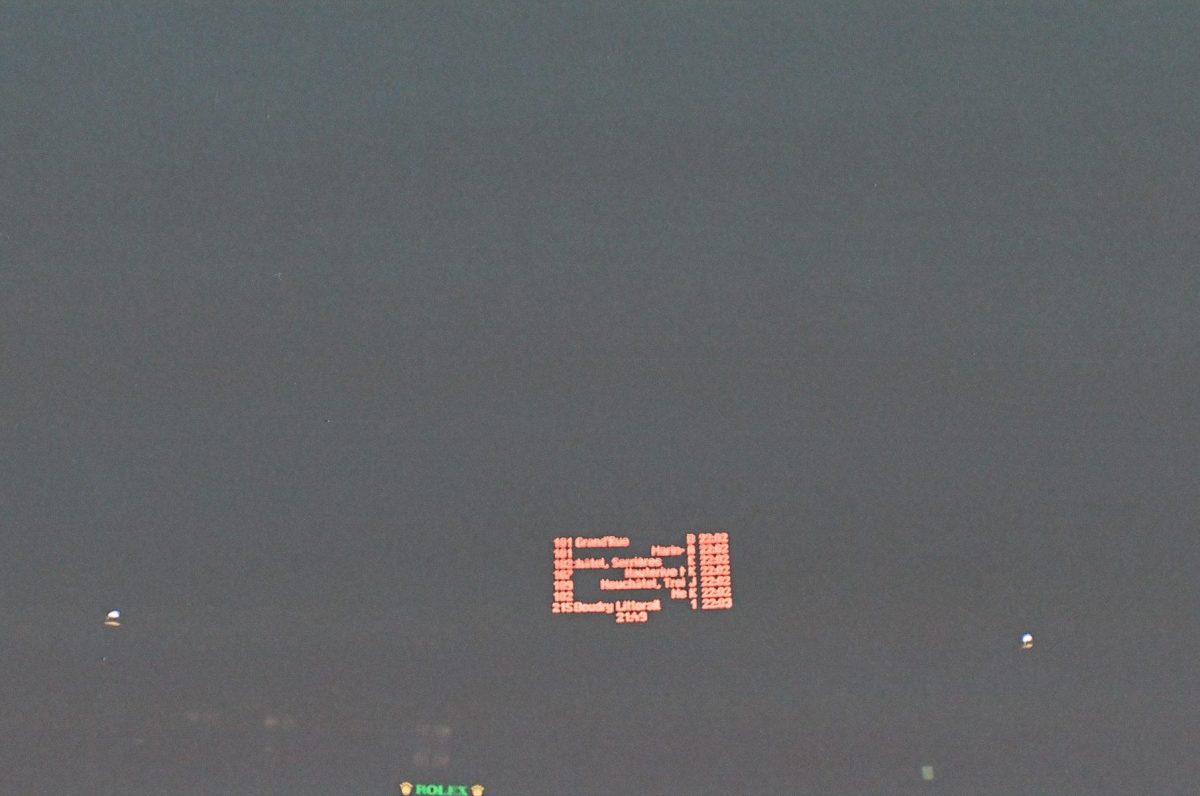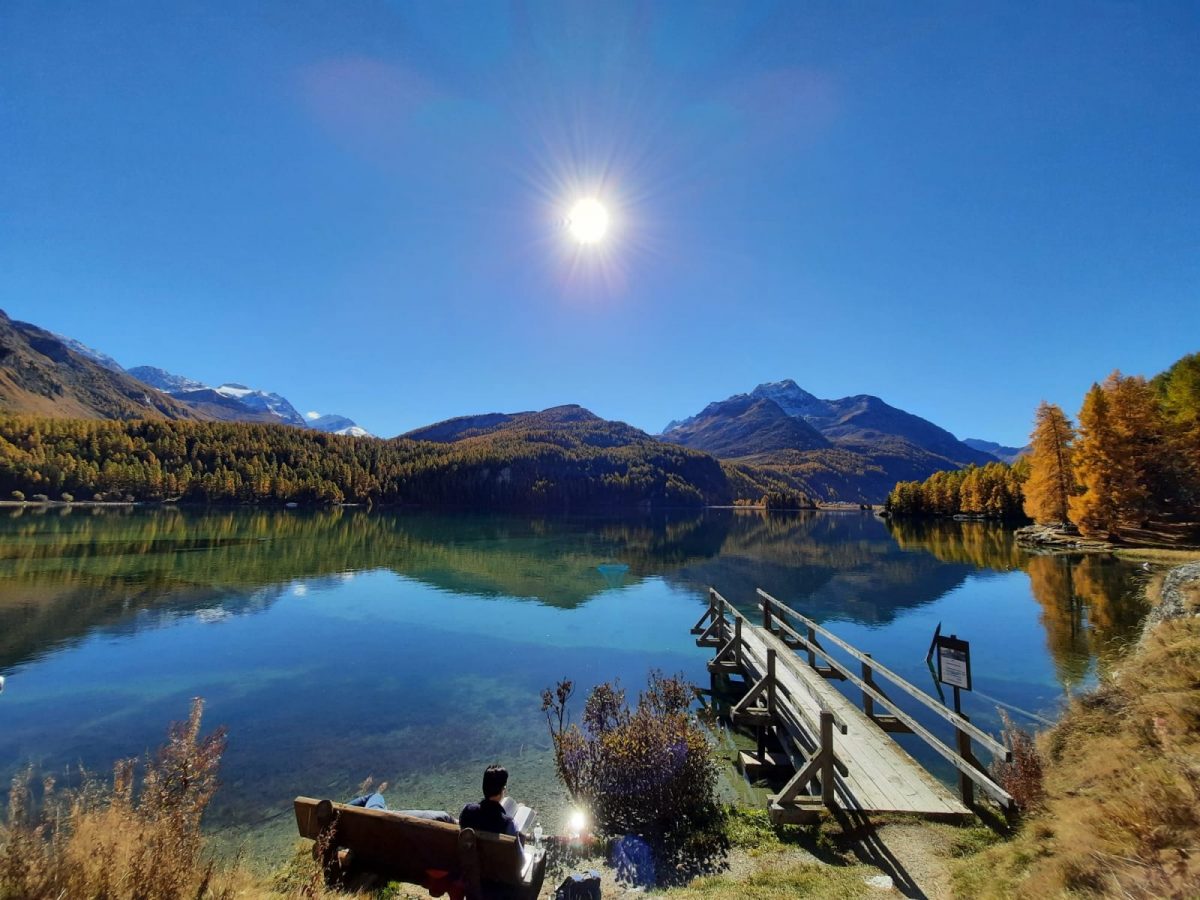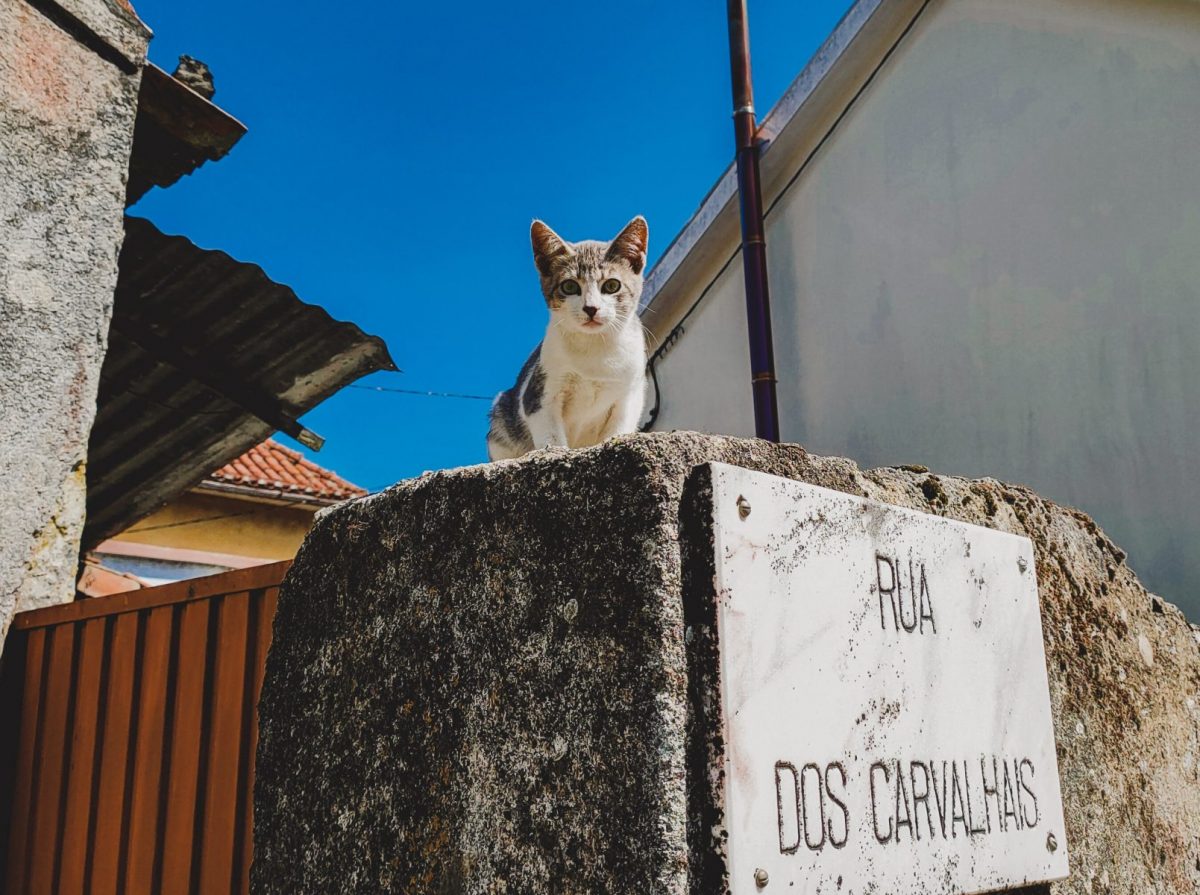Authors: Nicole Hlavova, Sophie Buhler and Giulia Massy
… this interview took place following our class with Boris on Derrida and deconstruction so we hope you enjoy all of the Derridean references! …
Nicole: Hello! Thank you for agreeing to do the interview!
Boris: Thank you.
N: So to start off, could you tell us a little bit about yourself, where you’re from and how long you’ve been at the University of Lausanne?
B: Oh my god, a long time, a long time. I’m originally from a country that no longer exists, Czechoslovakia. Like you.
N: Yes.
B: I was born in Prague so my mother tongue is Czech and then I lived in a number of countries including Tunisia, North Africa, France, and Switzerland most of my life, but I spent a good amount of time in the U.S. especially for my graduate studies at the University of California at Irvine, where I, at the time, already met Agnieszka. We were both students there at the time, and she too then came to Switzerland, and we became colleagues and that sort of thing. So yeah, I’ve been for more than 20 years now at the University of Lausanne, but at the same time, I feel that I’ve always been from many different places. And so what appears to be a rather stable and fixed position, is really more multifaceted than it seems. I teach in English at a francophone university, with a central European background, so all these things produce a mixture.
N: So since being at the University of Lausanne is there anything that stands out in comparison to other places you’ve studied or worked?
B: Well most of my teaching I’ve done in Switzerland, a few gigs in France, a gig or two in the U.S., but most of the time it was in Switzerland. Not only at Lausanne, but also at other Swiss universities. Not exactly all of them, but near all of them, I suppose, Geneva, Neuchâtel, Bern, Fribourg. So, I never taught in Zurich or the Ticino part, but in a number of places and it had to do with part time jobs that I held because academy, not just in Switzerland but in Switzerland in particular, it is rather an adventurous career, not always, but, you often go from one precarious job to another precarious job until you land a serious position. Not always, but very often it’s like that.
Sophie: You said you were a student at a Californian University. How do you find that is compared to being at university? Well, I mean you’re teaching here…
B: Right, right, right. Absolutely. Let’s see, in the U.S. system when you go to the university, you really go to the university in that you live on campus, you really sever the umbilical cord to family and place and friends. So it’s really this very formative episode in people’s lives. Having spent much time in Europe, to me, it was not cutting the umbilical cord, but certainly a very different experience living with people who all of a sudden were living independently. I’d had that feeling before, but it was their first immersion in that sort of life. So that’s one aspect. The other thing is that I went to grad school at UCI and my fellow students there had a very clear idea of where they wanted to go. Academia in the U.S., at least way back then, was much more professional than in Switzerland. It was thought of as a profession. Whereas given my generation and where I grew up, the university was not primarily a profession. It was primarily a place of higher education, of learning, of passing on that learning from one master to their students, you know, I mean, in a predominantly male ambience at the time, it was also the initiation by a master. If it so happened that you became a professional, well, you sort of became a professional, you know, I mean, par la force des choses, as they say, if you hung in there for long enough to, as it were, to become part of the system. Whereas there was an intentionality in the Anglo-American system that at the time wasn’t so present here. It’s changed. I think it’s part of the ethos here too, now. But thirty years back it wasn’t the case. Thirty years back, my fellow students there had a very clear idea of what they wanted to do. I mean their advisors were not only intellectuals and academic advisors, they were also professional advisors. So typically you would write the Ph.D. under the supervision of someone who would say, “you need a chapter on Conrad here because in the next five years there’s going to be openings in this or that field and they’ll need someone who has something on Conrad.” So there was strategic thinking which has since then made its way, its inroads, here, though not as much as in the U.S. at the time. That was certainly the main difference to me is if you studied something, it had to have a purpose for doing so.
S: Well, that’s quite nice and reassuring, I guess, in a way to study something for a purpose.
B: Oh, absolutely. Absolutely.
S: Is there anything you prefer about the U.S. in comparison to Switzerland or vice versa?
B: I like the mobility of the U.S. I like the flexibility of the system, much as I dislike part of this intentionality. I also admire the career-oriented education you get. It’s by no means easy to make it in the U.S. but because of the flexibility, because of the professional impetus, dedication, hard work, and of course luck and that sort of thing, it makes it possible for people to move around. So I do like that. What I like about Switzerland is exactly the contrary thereof. I like the, if you will, old style of what’s remained, what remains of it, the humanities. That is, the possibility of studying things in a much more open way. Well, like with the class on Derrida we’re doing, right? We’re in an English Department that enables us to do that without sticking to disciplinary and or period classes. I’m an Americanist, I love to teach Melville and Emily Dickinson and Sylvia Plath, but I’m happy that I am not confined to having to do that year in, year out. So I like that. The other thing I like about Europe is the politics. Yeah. Wink, wink. But not just in recent years. I think that, to say it very simply, there’s a way of being middle class in Europe, which gives you a lot of freedom, which you don’t have in the U. S.. It’s very difficult to live with a lot of freedom in the U.S. and be middle class, where, even if you don’t live from pay check to pay check, you’re still pretty limited. You really have to make it into the next level to have the privilege of freedom and mobility that you have here. So yeah, in terms of contrast, that would be that, I think.
N: We’ve noticed in class you’re very comfortable switching between English and French. So we were wondering what languages you can speak?
B: I speak six languages.
N: Oh, wow.
B: Czech is my mother tongue, and then French, English. I live in a Francophone environment and I learned French as a child and as an adolescent. English, German I acquired because of schools. And then I learned Italian and Spanish, one because I needed one to get into the university, to get a degree, and the other I started learning by traveling and then I earned a degree in Spanish as well. So I move amongst languages, but deconstruction is more than one language, as we all know. But joke aside, I think that moving amongst languages is also moving amongst ways of looking at things. [to Giulia] And I think, well, you’re blessed not to be in the Derrida class, but we see that as you shift from one language to another you make possibilities appear, things that are lost or gained in translation. I think that even if we’re monolingual, we constantly translate. And if you speak more than one language, which is, by the way, one of the things that I really like about teaching in Europe, that people are so multilingual—which is quite remarkable. You can’t appeal to that sort of, if not knowledge, at least consciousness of languages when you teach in the U.S. You can’t. They don’t know the languages. It’s not their fault, but that’s the way it is.
N: I wanted to ask this just because I was curious, but since you can speak Czech, do you read much Czech literature?
B: I don’t.
N: Or research it?
B: No. I never conducted any research at all. I read a little bit. I’m a slow reader altogether, but it’s worse in some of these languages. German and Czech are the worst for me in terms of speed and fluency. Even though Czech is my mother tongue, I never went to school, I don’t have any formal training in Czech, so it’s very difficult for me. And so I read Kundera in Czech, I read Čapek, I read a few authors but I don’t read much in Czech. I read newspapers, magazines, stuff like that. I’m perfectly fluent but with a somewhat limited vocabulary and my grammar is hilarious. [to Nicole] Do you write Czech?
N: Only texting my grandparents, so that’s the same for me.
B: And I’ll tell you what, I learned a lot of Czech from texting because if you put the spell checker, you have the distinction between trvdý y, měký I, for instance, which says nothing to most people, but it’s basically the distinction between the final y and the final i in Czech [the distinction between two spellings of the same sound in Czech, a particularly difficult grammatical rule]. That’s one of the tricky things, but the spellchecker will tell you, so little by little you learn. Whereas I would do that randomly; my relatives said I wrote the most hilarious letters ever because my Czech was so inventive.
N: Yeah, I never read it either, but I speak it with my grandparents. That’s how I picked it up.
B: Okay, well, that’s pretty good. That’s pretty good.
N: It is, all the accents are a bit confusing.
B: Oh, the diacritics in the Czech is ridiculous. Yeah. Absolutely ridiculous.
S: So… what are your main academic interests?
B: Oh, my gosh. Where do I start? It’s actually a very interesting question. My primary training is in literature. So I’m interested in fiction, poetics. This has brought me to things we were talking about in class today, that is, the possibility of fiction and what fiction means, and so that has triggered a whole series of theoretical interests which have included deconstruction, psychoanalysis, postcolonial studies. I mean all these theoretical aspects that stem from the performative aspect of language, language as something that produces whatever it is that we call “reality,” including the reality of ourselves. So, strangely fiction has brought me to that. And I think that originally I became an Americanist because American literature seemed to pose certain epistemological questions that, at least at the time when I was an undergraduate and then a graduate student, seemed to have disappeared from the canon of French or English literature where Shakespeare was Shakespeare and you were there to basically learn it by heart and admire it and say he was the greatest genius of all times and find all sorts of particulars in the text that constantly reinforced this thesis that from which there was no reason to deviate. Of course, things have changed radically, you know, and I see it clearly, for instance, when I talk to my friend Kevin down the corridor. That’s not the way Shakespeare is envisaged today. But again, what I’m talking about is thirty years ago. When you make those choices, what am I going to do? Thirty years ago, American literature and English departments where American literature was taught were those places of new emerging possibilities where theory was anchored. Theory was emerging in great force in the 80s and 90s and that’s what attracted me. So, my academic interests were shaped by that. By doing things in English departments and then gravitating toward the American aspect of literature, and then the more theoretical possibilities that were more specifically attached to American issues. And so it involved questions of race, questions of gender, questions of sexuality, and when I say race, sex, gender, I mean representations thereof or linguistic production thereof.
Giulia: Can you describe your journey into teaching literature and English culture?
B: As I said, American literature and American studies, for the reasons that I’ve just covered, but also, I suspect because of central European political refugee type of tropism, right, I’m a kid of the Cold War, and so America for my parents was this land out there that fought against communism. Sort of subconsciously, I think that there is a tropism toward things American because of that. As far as I can remember I have reminiscences of things American like movies and music. I learned my English listening to Nat King Cole and Frank Sinatra and the crooners of the fifties and sixties, my mother was listening to, so I learned my English listening to that. I then learned my French listening to Charles Aznavour. It’s part of the attraction, in addition to then things I think subliminally developed in me even though I wasn’t aware of it at the time. But American culture, American literature have always attracted me because they were in question. And I think it is still the case today, I mean possibly more than ever, right now, where the question of what America is, how it is, what sort of construct it is, in Derridean terms, what traces of itself does it leave, and how these traces erase themselves, even as they are produced. That’s the questions that have always fascinated me, and that’s what made me gravitate toward the American world at the time. Nowadays, I think I could just as easily gravitate to other worlds because the theoretical wind that started blowing in the 70s, I was too young then, but then in the 80s and 90s has now swept all the other academic fields so it is uncertain whether I would become an Americanist today. I mean today, 2024! It sounds a little bit like a joke but I’m not sure. I’m a little bit tired sometimes of trying to explain that to people. It’s a little bit painful.
G: And how do your Swiss students usually respond to English literature? Are there any cultural nuances that you find yourself having to explain?
B: Yes, absolutely. I think that being an Americanist in the U.S. you have to spend a lot of time deconstructing American culture for your American students because they’re less multilingual, because they travel less, because they’re less self-aware of their own culture and so on. And so you have to be more critical in the true sense of the word, you have to provide this critical distance. In Switzerland, and Europe in general, I find that you also have to do that, but you also have to—defend is not exactly the word—but explain. Explain that first of all, whatever’s going on right now, and I mean right now but it can be any right now in the last 30 years, there’s always a crisis somewhere in the world in which the U.S. is involved in some disrespectable manner: this is the history of the 20th century, basically. And even before, I mean the 19th-century Panama Canal, and before that, slavery, and before that, relation to indigenous tribes of “America,” and so forth. There’s always some scandal, to say it like that, in which America is involved. So you constantly have to explain that there is more to the U.S. than what meets the eye. In 2024, there is more to the U.S. than Donald Trump, and there is more to the U.S. than some exaggerated form of wokeism, there’s more to it than that. So the difference would be there. In both cases, you need to provide the deconstruction, the critical distance, you need to provide the critique but on this side of the water you also need to say, well, the culture also functions in ways which are not only horrible. It is an imperial culture, so it has all the flaws of imperial cultures. But it is also one of the cradles of democracy, right? Voilà. But as we have seen again today, the possibility of a major conception bears in itself the possibility of the destruction thereof. So, American democracy carries with itself the possibility of its erasure.
S: I see. Can you tell our readers a little bit about what you’re currently working on?
B: I am currently working on a study on the Western in movies specifically. It’s called ‘Framing the American West’ and it’s a study on a very limited number of films where I propose that the symbolic forms of the American Western have contributed to shaping the ethics and aesthetics and the political forms of the nation. Cinema in the 20th century has shaped aesthetics and politics, has given political and aesthetic forms to the nation and has exported those forms to the four corners of the world, thus participating to that movement we call globalization. It’s not the only phenomenon in it, but I contend that the Americanization of the world is in great part due to the so-called soft power of the U.S.. I don’t think it’s very soft, and the Western plays a role in that. My central analogy is with the invention of other symbolic forms, and that’s of central perspective in the Renaissance, by Alberti in particular who in 1435 formalized central perspective, and as a result, for the next 500 years or so, it was impossible to produce any sort of convincing painting that wasn’t in perspective. When people looked at that, they said, “ah, this is reality.” In other words, and here’s Lacan, 500 years ago: we the West produced a symbolic order in which we have believed to the point of mistaking it for reality. I propose that the American Western has produced something of that order, not primarily with the stories it tells, but with the forms themselves, which have to do with cinema, with movement, and with the possibility of almost endlessly repeating those forms.
S: That’s very interesting.
G: How has living in Switzerland influenced your perspective on the literature you teach or literature in general?
B: I think I would have to go to multilingualism again. It’s a true privilege to work in an environment where people speak at least two languages, but in most cases it’s three or more, and where people also come from increasingly varied backgrounds. Again, those things have changed over time; Switzerland thirty years ago was much more homogeneous than it is today, and I see it in my classes every day. I think that this has been a major influence. Also the fact harkens back a little bit on what I said before, you have to explain certain things and you have to explain them at a level that seems very elementary. At the same time, it reveals a lot to the students, and it would reveal a lot if it were done like that in the U.S. So, in New American Studies, for instance, I talk about the size of the United States which anyone who lives in the U.S. knows to be a big country. But the way you measure the country is very different from how you measure it here, right? So, for instance, if you ask someone how far Bern is from here? What will you say?
G: It’s far.
B: Okay, how far?
G: I don’t know. I’m very bad with distances.
B: Okay, how far is Geneva?
N: I’d probably just explain it like a 40-minute train journey. I look at it in terms of travel time because I’m also quite bad with distances!
B: Yeah, yeah, yeah, exactly. That’s typically an Anglo-American answer, right? So you say 40 minutes away. If I ask my Swiss students, that’s why I took the liberty of picking on [Giulia], they will say it’s 40 or 60 kilometres away. In the U.S. you’ll never say that. You’ll say it’s a 20-minute drive most of the time, or it’s a two-hour flight, or it’s a five-hour flight. All my friends who live in the Midwest, I say my gosh you live in the Midwest, and they’ll say, but it’s only a two-hour flight to Chicago. You know, that would be your commute to Zurich! So even very basic things such as distance and orientation are very different in Europe or in the U.S.. So, on the one hand, you have to explain that to students who will never say I live 20-minutes north of here. No Swiss student will ever say that. I mean I know there’s flying fish (but flying does not define fish, usually) so maybe someone will maybe say that one day, but nobody here says that usually. And if you live here you can explain that to people and all of a sudden you make very important things appear about the culture you’re teaching. I’m working on the American West, the whole notion of East, West, and North, and South in the U.S. has political meaning. The American South: that’s not the direction, that’s not the geographical direction, that’s a political direction. North is a political direction. East and West are political directions. So, if I teach this here I can show it and I make something appear which—I hope—will be of interest to students learning about the culture.
N: We were also wondering if you had any other sort of interests or academic interests outside of literature and English?
B: My partner asked me the other day what I thought comparative literature was, so I tried to explain to her what was usually meant by it. What it usually means is literature in more than one language which in Switzerland is a little bit strange since literature is always in more than one language, but it makes perfect sense in very monolingual countries such as France or the U.S.. And so it very soon appeared to me that any literature was comparative, that literature can only be comparative, but also that disciplines are comparative. And so yes, I say I teach literature, but really I also speak of psychoanalysis and of zoology and of technology and, an anecdotal example, I taught ILA before my class. I taught Shakespeare Sonnet 130, ‘My mistress eyes are nothing like the sun’, and that sort of thing. He says, ‘Mistress breath reeks’ and I was taking students to task about that. I think you cannot read this line without talking about what it means to smell good and smell bad. What does it have to do with desire? But then what do we call a bad smell? So, yes, I am interested in things that have strictly nothing to do with “literature.” So, for instance, I’m interested in what a bad smell is. I was half joking because I joke, but I always have joked. I was asking them who ate cheese? I got lucky: nobody was lactose intolerant. Everybody ate cheese in the room so everybody put up their hands and said Gruyère and I said, okay, now eliminate the Gruyère, keep the smell. How does it smell? It smells bad. It smells horrible. Right? The smell of cheese without the cheese is like taking your shoes off after a long day! It stinks. It reeks. Right? Voilà. What does it mean? It means that when I say that I teach literature it really means that in order to teach literature, whatever is known as literature, you need to be interested at least a little bit and you need to know at least a little bit about almost everything. Almost everything. You don’t need to be a physicist and you don’t need to be a biologist and a medical doctor. But you need to know something about it, and the more you know the better, of course. But the wider your span of interest is, the better I think can your understanding of the text be. But even more importantly, I think, the better you can possibly grasp for something that will help others read. Something, by the way, I find fascinating in Derrida. The way he jumps from one field of expertise to another. It’s fascinating. Deleuze is worse. I mean worse or better in the sense that one moment you’re reading about insects, the next moment you’re reading about cybernetics, and the third it’s about Lacan, and after that it’s psychoanalysis. It just moves organically from one to the other. So I don’t think I’m an expert on anything but I think I have a flexibility that enables me to follow different paths and I found that helpful in my teaching and my research and hopefully others have too.
N: Yeah, I think that’s one of the things I’ve always found I’ve enjoyed about literature overall is that you do touch on so many different subjects.
B: That’s right, absolutely. Next year I’m doing a class I’ve always wanted to do, so next year I’m doing it: it’ll be a whole year on Melville. Two semesters on Melville only. One of the novels is inevitably going to be Moby-Dick, which is, in itself, an encyclopaedia about how not to catch a whale, right? The array of things he touches upon, from metaphysics to religion to capitalism to cytology to homoeroticism to power relations to tyrants to sea navigations to parts of a ship, is almost infinite Of course you can say, oh, well, it’s all a metaphor, okay? What have you learned? I mean, what is the point of writing a 800-page books if it’s all a metaphor? Uh, you might as well not read it at all.
N: Is that next semester or next academic year?
B: It’s next academic year.
G: How do you keep your own passion for literature alive? Are there any works you return to for inspiration?
B: I apologize for the cliché, but teaching helps me immensely. Having to respond to the call, because it is a call, you see, and every year I’m called upon to teach, and I must respond. I must be responsible for my class, and under the injunction of that call, I respond. I think that if nobody called on me, maybe I would lose it. I’m not sure but I’ve always suspected that if I didn’t have to, I wouldn’t. And it’s not only because I’m lazy. I think that it depends on this ethical injunction. So, of course, you guys don’t call upon me directly. You call upon me because il faut bien aller quelque part. But at the end of the day, you’re in the classroom and I’m responsible for the class. And so I respond. I think it’s this ethical injunction which I think is contained in literature itself. All these books here [on the bookshelves behind us] are completely insignificant unless someone opens them because they’re all calling, crying out, to be read. Many of them will never be read which means that some of them will be forgotten. Hundreds of thousands of books have been written in the world that will never be read. Voilà. But that’s ethics of reading you see, that’s ethics. So what keeps my passion alive is that. It’s this ethical injunction. I read because I cannot not. Which, I think, is a definition of ethics. An ethical act is that which you cannot not do.
G: How do you think living in Switzerland has shaped you as a teacher and a reader?
B: Well, I think in the ways that I have mentioned before and I also mentioned the politics earlier. At this university and this department in particular, we have a wonderful amount of freedom which comes with responsibility and I think that this conjunction of liberty and responsibility is what makes this ethical response possible because if the request is so stringent and so strict that you can only answer then it’s not a response. I’m very Derridean in my response, but it’s your fault! My response is only a response insofar as the possibility of not responding exists. I only act ethically, I seek to act ethically only insofar as it is possible for me, at least theoretically, not to do so, and that’s a condition that’s only possible if you are at liberty to do that, right? If someone puts a gun to your head and said, okay, you’re teaching Moby-Dick, then you’re teaching Moby-Dick. In Lacanian terms it would be a reaction rather than a response. If you must, you can only react. But if I say something to you guys, you respond, either phatically by nodding or by smiling. You respond. That’s part of the ethical exchange, which you have sought and persevere in seeking, and that is only possible within the parameters of freedom, right? Taking you as an example, you’re doing this [interview] as a free will act, right? But you’re investing your time in that because in some mysterious way, you cannot not do it, but theoretically you could. You’re here this afternoon, whereas you could be playing tennis or sipping tea with your friends, because you responded to this very mysterious call. Sorry for making it so mystical, but it’s something of that order.
N: So just one final thing, Sophie and I haven’t been in Switzerland for very long, and you’ve been here for a little while now, so we were just wondering if there were any places in Switzerland you’d recommend visiting or like favourite places you’ve been to?
B: Ah, it’s interesting. I have been here for a long time but I’ve always travelled a lot. Not just because of my curriculum vitae but also because I’m of a generation for whom travel was part of what made you as an individual. Again, I’m a kid of the Cold War, but I’m very close to the Beat generation, people like that, for whom being on the road had meaning in itself. So I travel a lot and I tell people, I live in, teach in Switzerland and you get somewhat bemused reactions from people. Either ignorance, many people know absolutely nothing about Switzerland, including its geographical location or they know the classic clichés about the watches, the cows, and the chocolate. Beyond that you get a sort of almost spiteful reaction. “Oh, Switzerland, how boring, how annoying. You know, what a stupid place to live. I mean, especially considering that you’re three hours away from Paris. Why don’t you live in Paris?” I never found Switzerland boring in the least. Never. So do I have favourite places? I have nothing but favourite places. Not that I think that they’re all the same but what I like is the différance amongst them. Switzerland keeps differing, you know, you go 20 kilometres and everything changes. Architecture, climate, language, cuisine, religion, mores, everything changes. I mean, a little bit less so today for obvious reasons, but still. So Switzerland is not an extensive, but rather an intensive place, and that’s what I like about it.
N: Perfect, well thank you so much.
S: Thank you so much for doing the interview.
B: Thank you for your patience—thank you.


